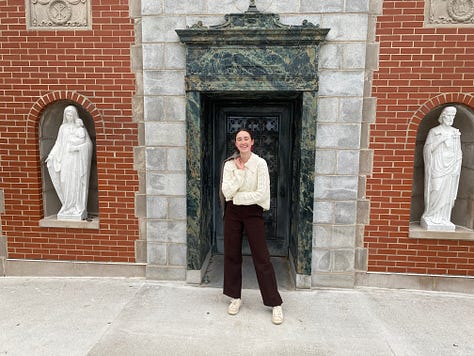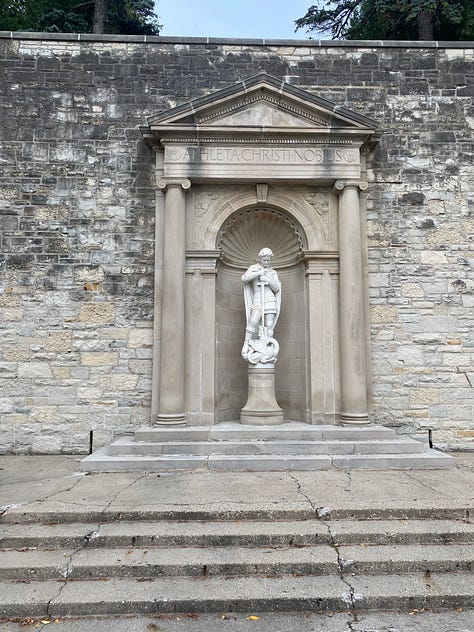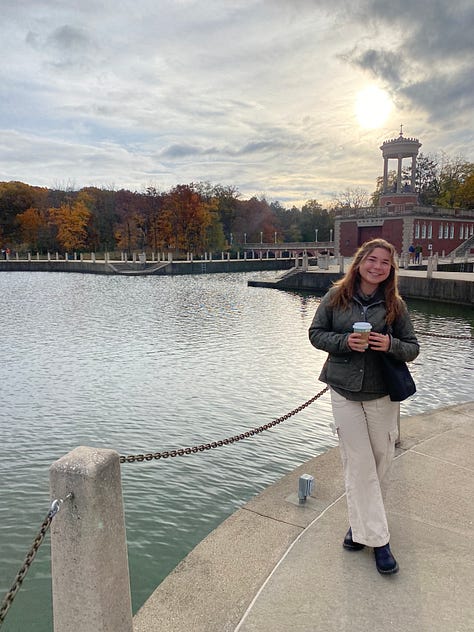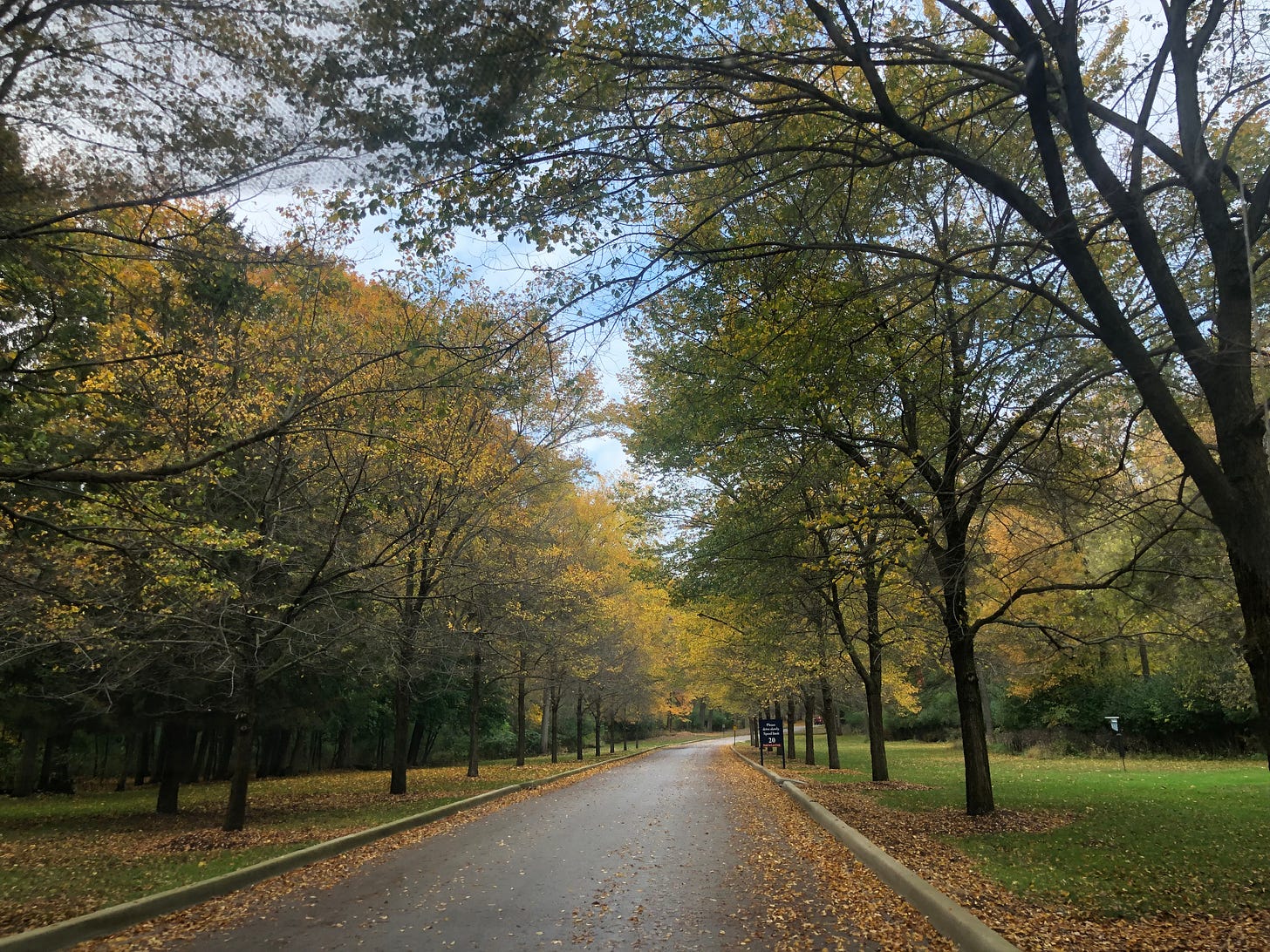We always have a good time at the NAAPE conference. This year, we invited our undergraduate interns, Anna and Teresa, to present with us on our “Teaching with Podcasts” panel.

Here’s a teaser of our new podcast episode, out later this month!
And now, here’s Anna and Teresa with the rest of today’s newsletter, followed by Harry’s advice for giving advice.
—Carrie
NAAPE






Official Elbow Patch Count
14 total patches observed
On Being an Undergrad at NAAPE
by CEE Intern Teresa Nelson
Being an undergraduate and finding oneself at NAAPE are two phenomena that when crossed create a delightfully odd and novel experience: one that won’t soon be forgotten.
One special feature of NAAPE that an undergrad is sure to find is Philosophers. Coming in a range of cadences, age, and dress, the Philosopher may be intimidating to the undergrad. But not to worry, for the Philosopher is the best conversationalist around. It is a rare and wonderful thing in contemporary society to find a person that is truly interested in listening to you, and truly values what you have to say. It is unfortunately common to speak with people who are only waiting for you to be quiet so that they can say what they have been thinking about saying (likely about themselves) for the duration of however long you have been speaking. (Admittedly, it is just as easy to be the person waiting to say the thing about themselves rather than mindfully listening to the other half of the conversation.) Philosophers don’t do this when speaking to the undergraduate–and they don’t ask any questions that they don’t want the answers to. The latter is especially evident to the undergraduate. When speaking to the Philosopher, the undergraduate feels as though they are the most important person in the room. They feel as though their every word, thought, and idea is of value and worth, simply for showing up in their consciousness and floating out of their mouth. Thus, the undergraduate is left feeling warm, happy, and confident at the conclusion of the conversation. This is a very special ability of Philosophers.
Another special feature of NAAPE that an undergraduate will surely encounter is the opportunity to do a lot of wondering: nearly three entire days of it. This experience is especially enhanced if the undergraduate happens to abandon their smartphone and other technology for the time being. Armed with a fun new conference notebook (and possibly four more of them crammed in their bag because they were free and cute) the undergraduate finds themselves attending multiple sessions, listening to the Philosophers talk about their research and ideas. If lucky, the undergraduate may witness a debate, observing a tangible electricity in the room as thoughts bounce rapid-fire. They may even be able to see the gears turning in the Philosopher’s mind before they raise their finger to speak. Now, while this is happening, the Philosophers are likely to use lofty language, and the undergraduate, if quick, can write down the words in their notebook for later search on the internet. From this, they can form a list (see below). The undergraduate will likely form questions when listening to panels, but the most fun comes after. Talking with Philosophers freely over dinner or drinks will take the undergraduate’s attention by its hand and lead it down various rabbit holes to questions about death, love, and the meaning of life. Why are we monogamous? What is a human life? What’s the definition of a feminist? Why are there so many elbow patches here? Questions like these will plague the undergraduate for days to come.
Teresa’s Word List
Anathema
Anodyne
Cantankerous
Codify
Comport
Diminution
Emaciated
Ephemeral
Equipoise
Exegetical
Fecundity
Inculcate
Magnanimous
Phronesis
Prudentialism
Ubiquitous
Vacuous
Vapid
Vindicate
Our Undergraduates
Anna Nelson is a fourth-year undergraduate majoring in Philosophy and Gender and Women’s Studies. Her senior thesis analyzes the importance of disagreement in the teaching of feminism. She also has a certificate in 2D studio art, and she’s currently experimenting with print making. When she’s not taste testing Carrie’s variety of baked goods and spilling tea with Teresa at work, she also loves to run, bike and swim and (hopefully!) will be competing in a triathlon soon.
Teresa Nelson is a second-year undergraduate studying Psychology with an interest and certificate in criminal justice, and with enough manipulation from Anna, she will soon be double majoring in philosophy. Her favorite philosophical question currently is how we name and define things. When she’s not being subjected to Anna’s ridiculous thought experiments, she loves to hike, run, write fiction and listen to jazz music.
Advice for the Real World
by Harry Brighouse1
Some philosophers of education—I am one of them—want to do work that is practically relevant, that can help actual decision makers in making the hard choices in front of them.
Rory Stewart, the former Conservative Member of Parliament, who served in the UK government as a minister for overseas aid, has recently published a rather wonderful (if depressing) memoir about his time in politics. In it he provides an extensive account of his time as a junior minister in the Department of Justice, in which he had special responsibility for prisons. British prisons are, on the whole, more humane than American prisons, but they are riddled with problems – low morale and high turnover among prison officers, high rates of violence among prisoners, extensive drug addiction, filth and other forms of disorder. He describes inviting a group of experts, including both academics and practitioners:
I asked my private office to organise a meeting of prison charities and criminologists to gather more ideas. They clustered around the small meeting table…in my ministerial office. One participant praised a governor who allowed his prisoners not to wear uniforms and to call him by his first name. Everyone seems to attribute the terrifying rise in violence to the new psychoactive drugs that were flooding prisons. And everyone seemed to prefer talk of structural reform of the welfare state… rather than how to control violence or reduce piles of garbage piling up in prison, or how to restore the pride and morale of the uniformed staff on the landings… “We should be talking here about child poverty” began an ex-governor. “The government budget should be directed toward early years education, not prisons.”
The advice Stewart receives from his experts is almost comically unhelpful. The speaker knows that this is a Conservative government that is not going to reduce child poverty or expand early years education, and also knows that even if it did so it would take many years before any effect would be felt in prisons. The speaker also knows that as a junior minister for prisons, Stewart has no influence at all over welfare or education policy. He can decide what to do about prisons. And not even everything about prisons: he has inherited a situation in which most of his budget is fixed and only a few policies can be changed at a time.
Suppose you are trying to do philosophical work that can guide actual decision makers. Any work of this kind is bound to be what Rawls calls “non-ideal theory” Ideal theory concerns the principles that should guide the design of, and the conduct of actors within, a just society – one in which all comply with the demands of justice. Non-ideal theory concerns the principles that should guide actors in all other circumstances.
If you want your theorizing to be helpful to actual decision makers then you need to think about their actual circumstances. You need to make choices about what to hold fixed, and what to treat as a variable. The farther away your choices about what to hold fixed are from their actual circumstances, the less useful your theorizing is for them, and the more reason they have to ignore you.
Pretending that the world is not how it actually is because we don’t like how it actually is does nobody any good.
Consider: Sometimes when I talk about charter schools members of the audience expostulate that what we need is total structural change to get rid of poverty and institutional racism, or that all schools should be public schools, often in a tone that suggests they think they are telling me something that wouldn’t previously have occurred to me. But charter authorizers lack the power to eliminate (or even reduce) poverty or institutional racism, or to make private schools illegal. Providing them with an analysis which tells them they ought to do those things and does not help them with the choice in front of them is like meeting bank regulators and presenting them with a sophisticated Marxist critique of capitalism.
Sometimes I get the impression that my interlocutors mistake making an empirical assumption for giving a normative endorsement. Like them, I think of poverty and institutional racism as great evils. But they’re real, and most decision makers (just like my interlocutors, in fact) lack the power in the short-to-medium and maybe even long-term to eliminate or even reduce them. They (like, at least I hope, my interlocutors) try to do good things within the constraints these evils set. Pretending that the world is not how it actually is because we don’t like how it actually is does nobody any good.
Of course, if you’re unwilling to assume the parameters of actual decision-makers in your theorizing, that’s fine. Not all theorizing should be, or even attempt to be, relevant to the here-and-now. It is fine not to be interested in theorizing in ways that will help guide actual decision makers. We need what my friend Erik Olin Wright called “real utopian” theorizing as well as theorizing for the short and medium term. But, we need theorizing for the short and medium term as well as real utopian theorizing. And to do that we need to discipline that thinking by trying to discern the actual parameters, and not pretend that they are variables. Rory Stewart’s experts managed to be utterly unhelpful by failing to do that. Philosophers of education who want their work to be valuable for decision makers should take care not to fail in the same way.
Keep in touch,
CEE
Based on a panel presentation at NAAPE 2023





